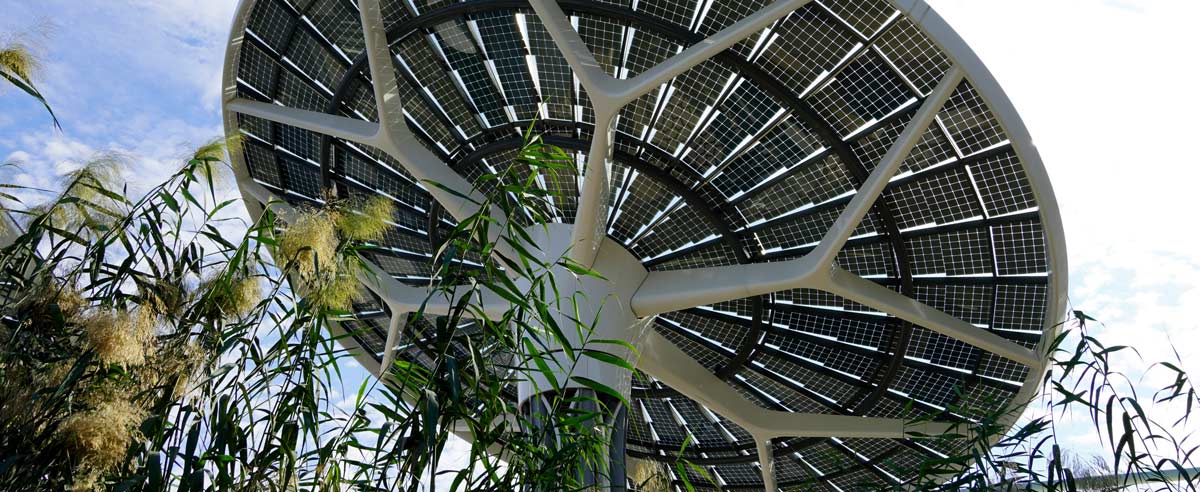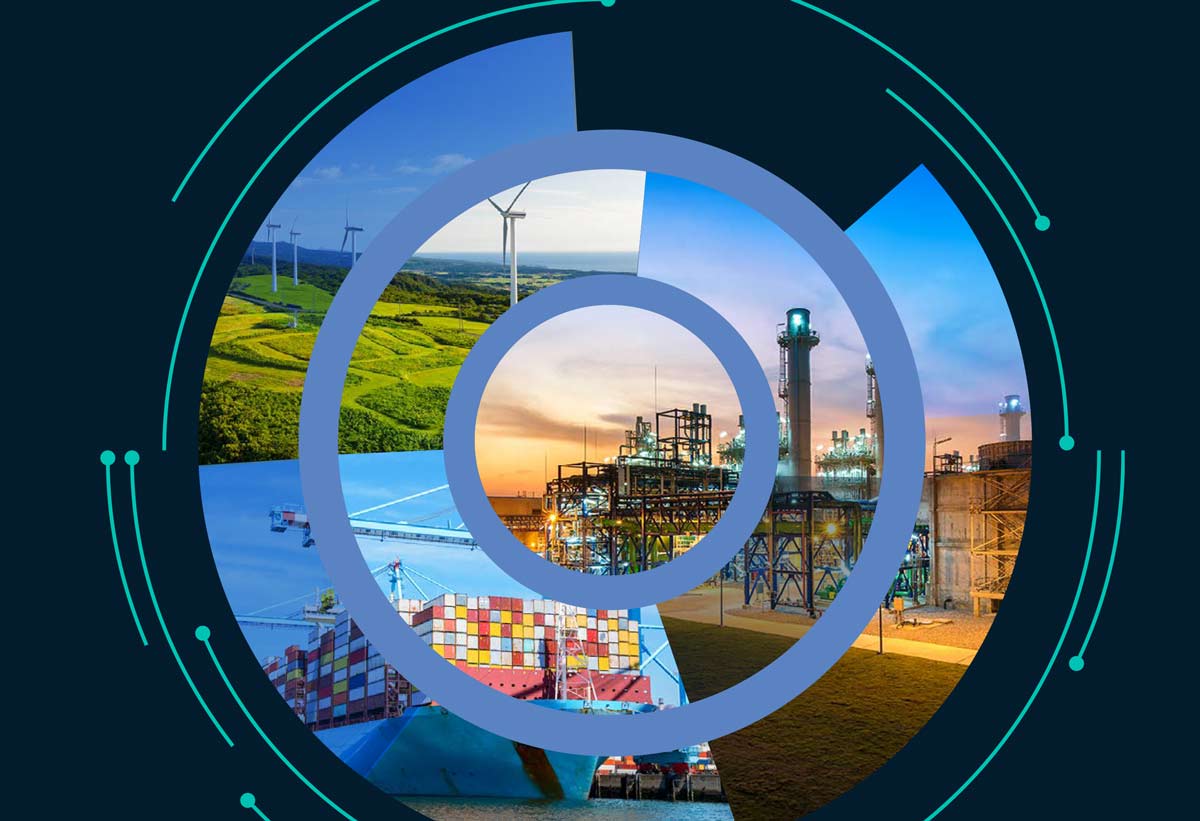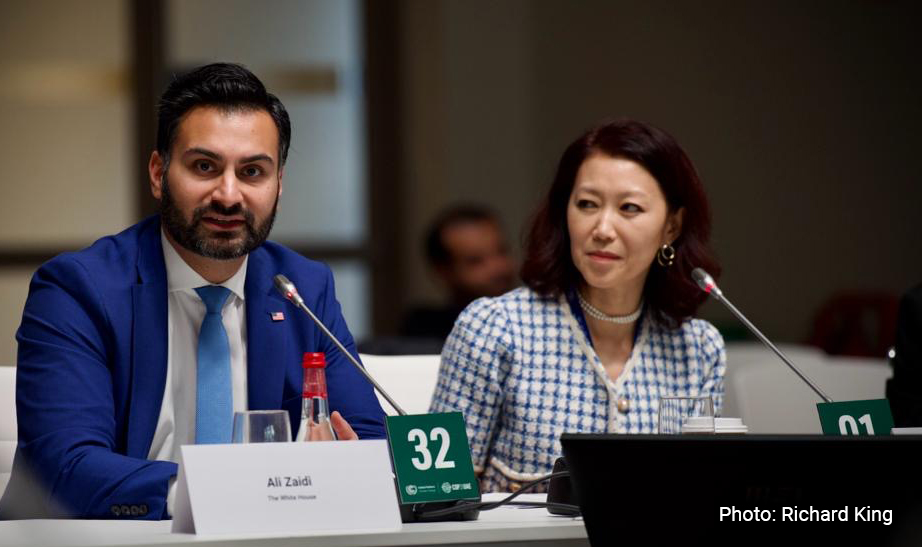How can the Gulf region, which has traditionally exported hydrocarbons, increasingly leverage its financial resources and know-how to help countries beyond its borders reach net-zero?
That was the question on the table at a private roundtable convened by the MSCI Sustainability Institute and the Atlantic Council at COP28’s Energy Day. The event invited leaders from business, policymaking, academia and finance from the Gulf Cooperation Council and globally to share their insights into how the region can help to scale decarbonization globally.
Held under Chatham House rule to encourage candor, the convening surfaced diverse – and sometimes highly diverging – views on how the interplay of hydrocarbon production, decarbonization technologies, climate adaptation infrastructure and finance will shape the region’s future and its global influence. Below are highlights from the conversation, which we hope will help inform how leaders across finance, policy and industry formulate their next steps following the proceedings at COP28.
Wishful thinking vs. pragmatism
- While the GCC is seeing more investment in reducing emissions and adapting to a warming world, “we also see a lot of wishful thinking that the region will phase out fossil fuels” stressed one participant from a premier think tank in the region. “We may want to tell ourselves that investment will be wholly in renewables, but the GCC is more pragmatic,” he added, noting that GCC countries are continuing to invest in oil and gas but with a focus on technology-driven improvements in efficiency and carbon removal.
- “The question needs to be how to lower carbon intensity, because most countries in the region are expanding production,” echoed another participant. “The GCC needs to invest in carbon removal because the idea of channeling the lion’s share of investment into renewables isn’t going to cut it.”
Transition finance – scalability is key…
- Sovereign funds across the GCC are making sizeable investments in developing markets overseas. The region has become one of the largest investors on the African continent, participants noted.
- GCC’s pragmatism is exportable, commented one participant from a multilateral development bank, who suggested the value of alternative currencies to remove the need for developing countries to borrow in dollars, which raise the cost of debt because of the volatility of local currencies. “Blended finance is not scalable,” he said. “It requires donor money, which there isn’t enough of. We have to have capital market reforms. You must drive to local currency.”
… as is risk and risk perception
- The GCC’s biggest investors are examining risk-adjusted returns for all investments, regardless of whether they happen to be conventional or clean energy, noted an executive from a sovereign wealth fund. There are, however, “regulatory factors to consider, because traditional energy is heavily regulated, it reduces cash-flow risks when compared with renewables,” he noted.
- “We need flexibility from asset allocators,” one regional asset manager noted, adding that while investors generally perceive investment in Africa as risky, most of the risks are macroeconomic; hence projects need long-term funding structures and an ability to link investors with borrowers. That’s especially true for investment in countries that don’t have an investment-grade rating, the asset manager added, noting that asset owners in the West will otherwise exhaust their allocations of non-investment-grade debt after investing half to two-thirds of their portfolio to Asia.
De-risking renewables, gas here to stay
- Though the case for renewables is appealing, this hasn’t resulted in more projects in developing and emerging markets because investors perceive those markets to be risky even if they’re not, said one renewables executive. Despite electricity consumption and demand being guaranteed, changing the perception of investing in this space “demands a mind shift.”
- That’s not to suggest that investment in renewables isn’t ramping up, participants noted. “Regulations will eventually force people to buy green hydrogen, and that will kick-start investment into regions and countries where there is an abundance of renewable energy,” he said.
- Several participants said that natural gas is here to stay and, if anything, the region would expand its LNG operations. “We are a major provider of gas turbines, and we don’t see this market slowing down,” an executive of a leading industrial conglomerate remarked.
Localization of energy supply
- While net-zero remains the goal, the biggest energy companies need to be technology agnostic, stressed one head of sustainability for a global energy company, noting their firm’s investment in hydrogen and bioelectricity. “You need to really think about energy access and what’s most appropriate for each country” she added.
- To facilitate greater deployment of renewables, “Africa needs more baseload energy,” said a participant from a multilateral development bank, noting the pressure to decarbonize. “First we need to carbonize,” he said, adding the importance of investment for interconnection of grids and universal access. “You can’t build a large solar park if you do not integrate it with the grid,” he noted.
- The GCC’s geographic position between Europe and North Africa makes it uniquely suited to export renewable energy to developing countries, noted one participant, who added that the region’s access to low-cost traditional energy also positions it to lead in the development of carbon removal alongside steel, cement and other carbon-intensive materials.

Solar panel at Expo City, Dubai
Policy recipes
- Regulation can be an accelerator, noted a renewable energy executive, citing regulations that will drive demand for green ammonia and hydrogen “that will kick-start trade flows into Africa.” Stability of policy matters, commented one banker, pointing to next year’s presidential election in the U.S. Depending on the outcome, “how does it change the next COP?”
- While the economy will depend on fossil fuels for a while still, investors in the GCC should also focus on institutions that can build new technologies at the speed the shift demands, stressed one adviser to the region, who noted 2023’s standing as the hottest year on record. “We are in a time-bound test,” he said. “We have to focus on technologies that work.”
50 shades of hydrocarbons
- Abatement technologies are important, observed one participant, yet banks fear being named “above the fold in the FT” if they lend for their development. “Ideally, COP28 would get everyone on the same page and not penalize banks for making these investments,” she added.
- “In this transition we will learn about the heterogeneity of hydrocarbons,” said a finance executive. “Not all molecules are the same from an impact standpoint; the GCC has available the least-emissive and most sustainable hydrocarbons on the planet,” he noted, adding that the GCC would likely be last region to stop producing oil. “The first barrels to be wound down will come from the most expensive regions,” he predicted.
- A Dubai-based energy consultant urged participants to look beyond carbon removal. “There is a critical need for low- carbon materials globally, and the GCC is a natural hub for low-carbon industry, but CCS and hydrogen have got to come into the picture to enable green industry in this region to thrive.”
Looking ahead
Most participants agreed on both the GCC’s unique advantages of geography and access to raw materials that lower the costs of production and position the GCC to play a key role in enabling its own energy and economic transition and the transitions in neighboring regions.
There was broad agreement that developed markets, including the private sector and finance, tend to focus on decarbonization without adequately addressing fundamental challenges of energy access for the Global South, which requires more pragmatism.
Mirroring debate among climate negotiators and policymakers at COP28, participants in our roundtable also differed on how quickly, or completely, a phasedown of conventional hydrocarbons will occur. Many agreed, however, that forging a constructive path requires dialogue between market participants with polar views and a wider understanding that hydrocarbons can vary substantially in both cost and carbon efficiency.
The MSCI Sustainabilty Institute expresses its appreciation to the Atlantic Council ‘s Global Energy Center for co-hosting this COP28 roundtable.


